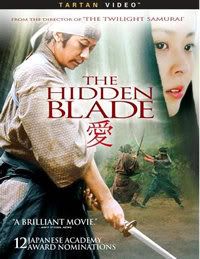The Hidden Blade
 The Hidden Blade ***1/2
The Hidden Blade ***1/2"The Hidden Blade" is the closest thing to the samurai masterpieces "Seven Samurai" and "Rashomon" that you’ll find in this millennium. It’s stunning, with great performances, a nearly perfect script, with the best fight sequences I’ve seen in a long time. At times, you can just ignore the story, and let the amazing visuals wash over you. I wanted to be inside this world, and afterwards, I was brought back to reality, on a grim and dreary day in June. There were times where I couldn’t even believe that there was a movie crew around the actors. It was as if it were actually happening.
We have a rather simple story. There is the Sir, who has a peaceful existence with his friends and family. The audience can tell that he has his eye on the maid, who is being trained by his mother. She ends up leaving the family, and ends up getting married. Sir says that once she left, the light in his life and existence went out. He does see her again, three years later, and he claims that she is unhappy, no matter what she says. She ends up getting sick, and Sir ends up seeing exactly what kind of way she is treated by her "loving" family. They are the kind of people who leave her in the coldest room in the house when she is suffering from a massive illness. Sir takes her out of the house, and demands her husband that he divorce her. The two end up living together. He takes care of her until she is well, and then when that day comes, she ends up taking care of him. He loves her, but doesn’t admit it. She loves him, and doesn’t admit it. That’s the love portion. And then there is the historical portion. The times are changing, and so is the way of the samurai. There are people who believe that instead of fighting with swords and spears, the samurai should take advantage of the new technology, and fight using guns and cannons. The samurai are not happy with this development, and the elders remember the virtue that the samurai should hold dear to them. And then there is the action portion. Sir is recruited to go out and capture his escaped prisoner friend, who is a wanted criminal. His friend vows that he will kill whoever is sent to go after him, and then he will kill himself, using an ancient samurai technique which will allow him to maintain his dignity.
All three of the portions happen slowly. It’s a film with it’s own pace, that one has to get used too. It works as a romance, as a history lesson, and as action. It even has it’s own dark humor. It’s not perfect, but it comes very close to the samurai classics of Kirusowa, the master of the genre. I must again applaud the cinematography, which truly shows the green of the forest, the white of the snow, and the dense of the fog, all perfectly pertaining to the story. The final shot will leave a smile to all faces. It’s the perfect example of what Xavier and Wendy from "Russian Dolls" should not do in their TV movie script. It is word for word of a fight that two characters had in the beginning, but with different tones of voice it leaves a different feeling. It’s amazing how the same conversation, word for word, could leave different feelings just by the way it’s said. Seeing things like "The Last Samurai," which I did enjoy, pales in comparison to the real deal. It may not be a masterpiece, but "The Hidden Blade" is indeed the real deal.

0 Comments:
Post a Comment
Subscribe to Post Comments [Atom]
<< Home